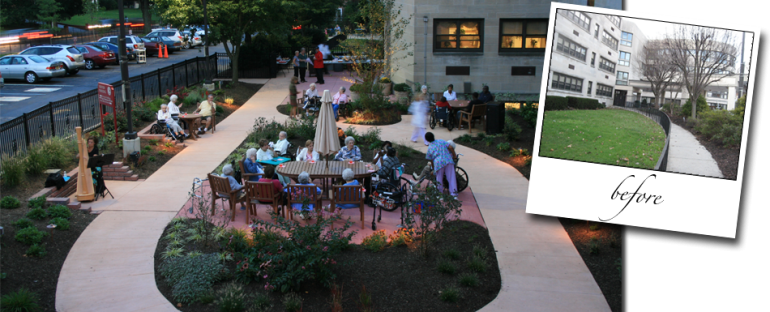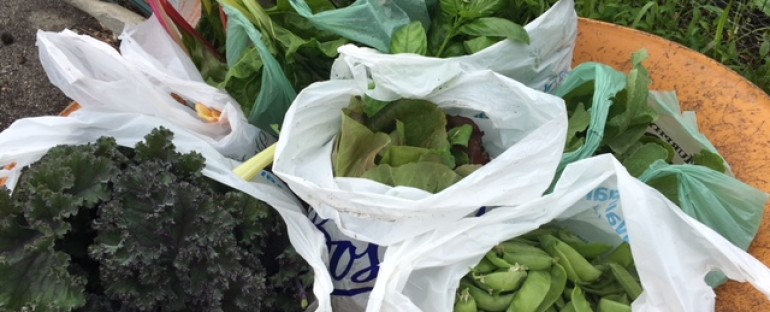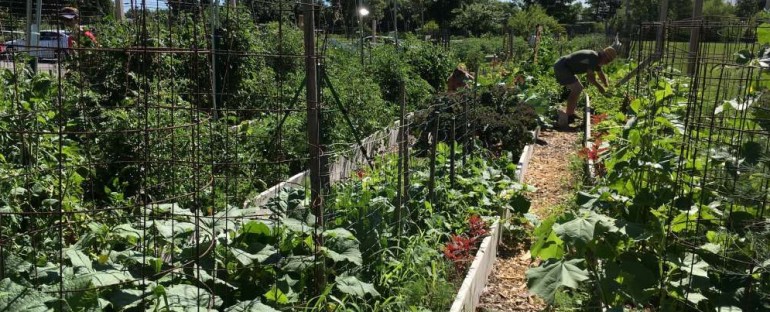- Home
- About Jack Carman
- Case Studies
- Brandermill Woods Alzheimer’s Garden
- Cathedral Village Butterfly Garden
- Foulkeways CCRC Herb Garden
- The Gift of Life Family House
- The Tranquility Garden at McAuley Convent
- The Healing Garden at Kimball Medical Center
- Meadowood Senior Living, Worcester, PA
- The Woodland Garden at Meadowood
- The Atrium Garden at Meadow Lakes
- The Back Porch Garden at Medford Leas
- Therapy Garden at Merwick
- River Garden at the Atrium
- St. Francis Country House
- St. John Neumann Nursing Home
- St. Mary Manor Nursing Home
- Virtua Camden Hospital
- Services
- News
- FAQs
- Useful Links
- Contact Us
Wednesday, November 13, 2019
When life hands you lemons – or boatloads of rain – it’s time to make lemonade. Given the psychological, emotional and physical benefits of therapeutic landscape gardens, it’s imperative to shift perspective. With a new plan to adapt to this year’s rainy reality the older adults in your care can continue to reap the benefits of your garden, rain notwithstanding.
For optimal health, humans are frequently told, “Listen to your body.” Apply this adage outward and listen to your plants to maximize their health and vibrancy. Robust, happy plants burst with health that radiate to your therapeutic landscape garden visitors, impacting the physical, emotional and spiritual sense of wellbeing of those visitors.
Between Mother’s Day, Nurses’ Week and Teacher Appreciation Week, in May we celebrate nurturers and the act itself of nurturing.
Garden-themed presents help to give the gift of good health to older adults. Encouraging engagement with gardens nudges older adults to maintain social connections, while strengthening their physical and emotional health. Four practical, and thoughtful, gardening gift ideas to consider this holiday season: Replace older gardening tools with ergonomic tools. Seniors may feel reluctant to spend the money on something they don’t deem a necessity, but proper tools will allow seniors to reduce strain and injury while continuing their beloved hobby. Then, have the still-perfectly-good previous tools donated to a nonprofit in your community. Raised garden planters. These wooden raised planters, which you can buy in retail stores or online, may be considered by some older adults to be too pricy of a splurge to buy for oneself. They make a great gift, allowing older adults to continue gardening without needing to hunch over or bend knees. Wind chimes. Those with limited access to the outdoors can still enjoy the calming movement of the breeze when you give the gift of wind chimes. Consider gifting bamboo wind chimes to men and metal ones to women. The lower octaves of bamboo are more easily heard by men, while the higher octaves of metal are more easily heard by women. Gardening gift certificate. Purchase a Burpee seed gift certificate and request a free Burpee seed catalog (available in late December through April, or until supplies last.) Those living on a fixed income still enjoy dabbling with new plants, but may not feel comfortable committing their budget to plants that are not tried-and-true. Gardening keeps both the body and the mind active, and is the #1 hobby for senior citizens. Choosing useful gifts that promote physical and emotional health will benefit the older adults in your life well after this holiday season is a wrap.
After Thanksgiving, both bellies and hearts are filled with gratitude. Leverage that sense of community spirit and goodwill to spark engagement with your therapeutic garden this fall. All of your publics – from seniors who live within your community, their families and visitors, your staff and volunteers, and the community at large – can benefit from your garden. In today’s world, families expect communities to provide opportunities for renewed, or newly discovered, purpose and passion. Look around and think beyond flowers. What do you have access to, in terms of natural resources, interest and talent? Director of Dining at Foulkeways (Pennsylvania) John Kennedy shares that they have “always had a spirit of community.” Their property also happens to boast more than 20 fruit trees. Foulkeways capitalized on this natural opportunity for engagement, involving residents in caring and harvesting the orchard. Staff and residents alike then host what is collectively known as the “Sharing Table” where anyone with a generous spirit can contribute or receive fruits, vegetables and herbs grown by others. What is your differentiator? A few other interesting ideas we have come across that engage older adults, while contributing to a sense of gratitude, include: Partnering with a local food pantry to collect and host a food drive for fresh vegetables and fruit Teaching older adults how to manage honeybee hives, and then giving honey away as gifts Creating essential oils from herbs grown on site, such as peppermint or lavender, and incorporating those essential oils into wellness activities for residents
Happy New Year! A byproduct of the “back to school” season that represents a fresh start for our society’s children and their parents, many Americans consider September to be a second “new year” of sorts. Extend this sentiment to your approach to your therapeutic garden. September is the perfect time to reboot by planting fall crops to extend the life of your garden. Doing so will make you feel as if you are reaping the benefits of a second summer. In many climates across the United States, September is prime time to plant lettuce, arugula, spinach, swiss chard and kale. Fall greens also taste sweeter than their summer cousins. Mother Nature spurs plants to produce sugars when the temperature begins to drop, to protect itself against freezing. (Sugar water freezes at a lower temperature than plain water.) [justified_image_grid ids=1986,1985 row_height=350px] Some of these fall plants, particularly spinach and lettuce, will even continue to mature through the winter, leading to an early spring crop to harvest, as well. President of Design for Generations Jack Carman offers this common sense, insider tip when planning fall gardens, “Although so many vegetables and other plants thrive throughout the fall season, it can be hard to find seeds in stores this time of year. Next year, stock up on seed packets in the spring and hold onto them until September.” Ripping out faded summer plants and reinvigorating your garden in September will provide an updated, fresh space for older adults, their families, and your employees to enjoy. Gardens, fresh air and sunshine are for more than just the spring and summer months.
This month, shift your focus to air movement within your therapeutic garden. Perception is reality; with air movement create the perception of a cooler, outdoor oasis – despite these hot, muggy August days.
In many places, mid-May signals the beginning of planting season. The scent of lilacs and honeysuckle perfume the air and seedlings eagerly push through the soil, reaching toward the sun. One thing not typically on the minds of gardeners this time of year is pesky summertime pests such as mosquitoes and flies. But, with some simple advance planning, you can create a therapeutic garden that becomes a boon for your older adults, while a hindrance to insects that not only annoy, but can cause skin irritation and carry disease. Three plants you should consider adding to your garden this May include: Lemon balm. A perennial that is part of the mint family, lemon balm adds a delightful, light fragrance to your garden. The plant contains high levels of citronellal, a compound that bugs will naturally shy away from. One note of caution: this plant loves to spread, so consider planting it in containers. Marigolds. These bright, hardy annuals contain pyrethrum, a natural insect repellent. Marigolds will thrive both in the ground and in containers. Consider planting near doorways and windows, to discourage mosquitoes from coming indoors. Helpful hint: collect the dead flower heads and store in a dry place, for an early spring, do-it-yourself window box planting project with older adults next year. Lavender. Another perennial, lavender thrives in warmer climates and is well-known for its distinctive scent. In addition to repelling insects, the burst of color that the flowers provide can serve as a guide for older adults who are living with diminished visual acuity. Thinking ahead now, while still early in the season, will allow you to reap the natural rewards of a garden that is more pleasant to spend time in this summer.
Produced by the U.S. Department of Agriculture as a propaganda item for World War I, posters urging, “Uncle Sam says garden to cut food costs” sprouted up across our country. During World War II families planted victory gardens to help prevent food shortages. Today we normally associate gardening with improved mental and physical health, not with patriotism. However, the older adults in your care, as well as your employees and visitors, may feel stressed by Uncle Sam as April 15 approaches. Leverage the power of your therapeutic garden to soothe both body and soul this tax season as we all participate in the yearly patriotic ritual of paying taxes. In 2017, we now have over 100 scientific studies across a variety of disciplines that show that gardening and being in nature positively impact people’s wellbeing. Three quick gardening tips to relieve stress this tax season: Expand rest stations in your garden. Reclaimed wood re-purposed as benches add a rustic, artistic touch that invite guests to linger in your therapeutic garden. Create a nature journal class that meets in the garden, to document this year’s growth, starting with the return of our feathered friends and the season’s first blooms. Encourage the gentle exercise and socialization of preparing the garden for the year: gather interested volunteers to weed and prep this year’s flower beds. Direct contact with dirt has been shown to trigger the release of serotonin, elevating mood. Uncle Sam’s presence is universally felt this month across the country. Do your patriotic duty – 2017 style – and improve both the physical and emotional health of those who turn to your therapeutic garden for support.
Recent Articles
- 15Oct
Healing Design: The Benefits in Creating Therapeutic Gardens
Imagine a place that can do the impossible – spark...
- 04Nov
Trees Are Therapeutic
Trees! We all know that they provide shade and give...
- 27Oct
Is The Covid-19 Pandemic Reviving A Historic Residential Design Feature?
The pandemic has changed our relationship with our...
- 28May
Time to Watch Clients’ Gardens Grow
After being cooped up indoors due to shelter-in-place...
- 27Feb
Landscaping Can Grow Engagement While It’s Shrinking Expenses
Just like many other community operations, landscaping...
Recent Case Studies
Categories
Contact Information
Popular Posts
-
HORTICULTURAL THERAPY AND VETERANS
Horticultural TherapyVarious programs are are being developed to help Veterans...
-
FOOD GLORIOUS FOOD
Horticultural TherapyVisiting London, I came across a demonstration community...
Categories
To find out more, including how to control cookies, see here: Cookie Policy
















